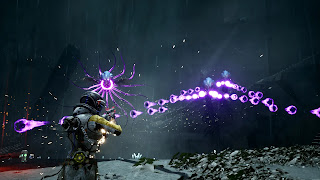How Hades and Returnal Master Roguelike Storytelling
Recently I've been playing the 2020 indie hit Hades quite a bit. It takes me a while to get adjusted to a new game but I found the addictive groove of Hades' rougelike and random design to my liking. It's also a great game on Steam Deck, when I've got 30 minutes to kill at work I power up the Deck and go for a quick playthrough.
But the more and more I played through Hades' story the more I began noticing similarities to another rougelike I've played, Returnal. With Hades II announced and the PC port of Returnal out I figured it would be a perfect time to talk about how the two master one thing very well, story integration. Namely how the two games integrate story into the design to tell two radically different tales in terms of tone.
The first is Hades, casting the player as the titular lord of the dead's son, Zagreus, as he tries to escape his father's domain. Problem with that is he keeps dying; the good news is that as an immortal Zagreus just respawns back to life to do it all again. Becoming stronger and more skilled as he repeats his escape attempts through his father's domain, along with the help of his fellow gods who are largely out to troll the ol' God of the Dead.
Hades' story knows death means basically nothing and uses that to enhance its storytelling. Hades himself doesn't treat his son as some massive threat, just a rowdy brat who needs to be sent back to his room. Even the bosses you kill come back in inventive ways, to the point where Zagreus talks to them like irritants as opposed to threats. You actually learn more about the bosses to by fighting them repeatedly and I won't spoil the details here.
The point is, unlike most stories and games, where death is a stop to all progress, you learn more about the world, characters in it, and Zagreus himself by dying. In my opinion, getting past Hades in the first playthrough actively hurts the tale the devs are trying to tell, though watching first playthrough runs is fun, I'll admit. But it's more satisfying for both you and Zagreus to climb to the top of Hades and send Zagreus' dad back to his realm.
Now you can speed that up by enabling a mode that boosts your health and power when you die. Which doesn't take away from the story but does ensure that you will get out at some point. Like I said, dying is sort of the point with this tale.
Hell, beating Hades isn't the end, as circumstances force you to do it all again for 9 more times before the credits roll. And you can even keep at it just in case you want to side quest and learn more about the characters within the House of Hades. It's one of the few games where dying doesn't aggravate me, but gets me excited to see what fun thing is next, what I'm gonna learn, and what intricacies of the world I'll see next.
Returnal by contrast chooses to tell a story of hopelessness and despair. Following an astronaut named Selene as she crash lands on the world of Atropos and becomes trapped in a cycle of death and rebirth, restarting from her ship everytime she dies. Selene's mission is to ascend a tower and reach a mysterious signal. But as you explore the world you come across other Selene corpses and the real madness begins.
Through the cycles you play the past, present, and future all collide. Logs of Selene rambling, crying, and ranting can be heard, the timeframe unknown. This means the game can add them in per-run as you move, time itself is fluid in Returnal. And that leaves the player to wonder how long Selene has been on this planet or if it's a portent of some unseen future.
Eventually what's real and what's fantasy stop mattering at a certain point, just pushing through the cycles, the madness not mattering as long as you can reach the top. Constantly getting stronger as you do so, mastering the game more and more as you climb to the top. By the end you're confident in your victory, you escape, a sigh of relief as you see Selene escape, grow old, and die... only to be reborn on Atropos.
At this point Selene and the player begin descending into Atropos itself and into the madness that you held off for so long. The descent into madness both literal and metaphorical as both the player and Selene begin questioning everything around them. Even whether or not Atropos itself is real or a metaphor for Selene's broken mind. Both rampant curiosity and despair grow in both Selene and the player.
The final nail of despair in Selene's coffin however, is when your curiosity fades and you simply stop playing. The true bleak despair from when you simply remove the game's disc and never put it back in. In real life this means you moved on to other games. In game however it's representative of Selene giving up on even trying to escape, despair having truly won.
Honestly, I could go on about Returnal's story but I don't want to go off track or get too deep into spoilers. The point is that Returnal, alongside Hades, use their roguelike design to emotionally connect the player to Selene and Zagreus' tales. To a point where death isn't a handicap as it is part of the story, a true connection and bond between hero and player unseen in many other games. It's what makes them truly special in my opinion and true masters of rougelike storytelling








Comments
Post a Comment